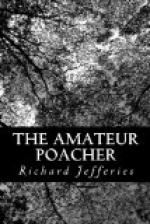The baffling shadows and the moonbeams on the barrel, and the faint reflection from the dew or hoar-frost on the grass, prevent more than a general direction being given to the gun, even with the tiny piece of white paper which some affix to the muzzle-sight as a guide. From a punt with a swivel gun it is different, because the game is swimming and visible as black dots on the surface, and half a pound of shot is sure to hit something. But in the water-meadows the ducks get among the grass, and the larger water-carriers where they can swim usually have small raised banks, so that at a distance only the heads of the birds appear above them.
So that the best time to shoot a duck is just as he slopes down to settle—first, because he is distinctly visible against the sky; next, because he is within easy range; and lastly, his flight is steady. If you attempt to have ducks driven towards you, though they may go right overhead, yet it will often be too high—for they rise at a sharp angle when frightened; and men who are excellent judges of distance when it is a hare running across the fallow, find themselves all at fault trying to shoot at any elevation. Perhaps this arises from the peculiarity of the human eye which draughtsmen are fond of illustrating by asking a tyro to correctly bisect a vertical line: a thing that looks easy, and is really only to be done by long practice.
To make certain of selecting the right spot in the osiers over which the ducks will pass, for one or two evenings previously a look-out should be kept and their usual course observed; for all birds and animals, even the wildest wild fowl, are creatures of habit and custom, and having once followed a particular path will continue to use it until seriously disturbed. Evening after evening the ducks will rise above the horizon at the same place and almost at the same time, and fly straight to their favourite feeding place.
If hit, the mallard falls with a thud on the earth, for he is a heavy bird; and few are more worthy of powder and shot either for his savoury flavour, far surpassing the tame duck, or the beauty of his burnished neck. With the ducks come teal and widgeon and moorhen, till the swampy meadow resounds with their strange cries. When ponds and lakes are frozen hard is the best time for sport in these irrigated fields. All day long the ducks will stand or waddle to and fro on the ice in the centre of the lake or mere, far out of reach and ready to rise at the slightest alarm. But at night they seek the meadow where the water, running swiftly in the carriers, never entirely freezes, and where, if the shallow spots become ice, the rising current flows over it and floods another place.
There is, moreover, never any difficulty in getting the game when hit, because the water, except in the main carriers, which you can leap across, hardly rises to the ankle, and ordinary water-tight boots will enable you to wade wherever necessary. This is a great advantage with wild fowl, which are sometimes shot and lost in deep ooze and strong currents and eddies, and on thin ice where men cannot go and even good dogs are puzzled.




